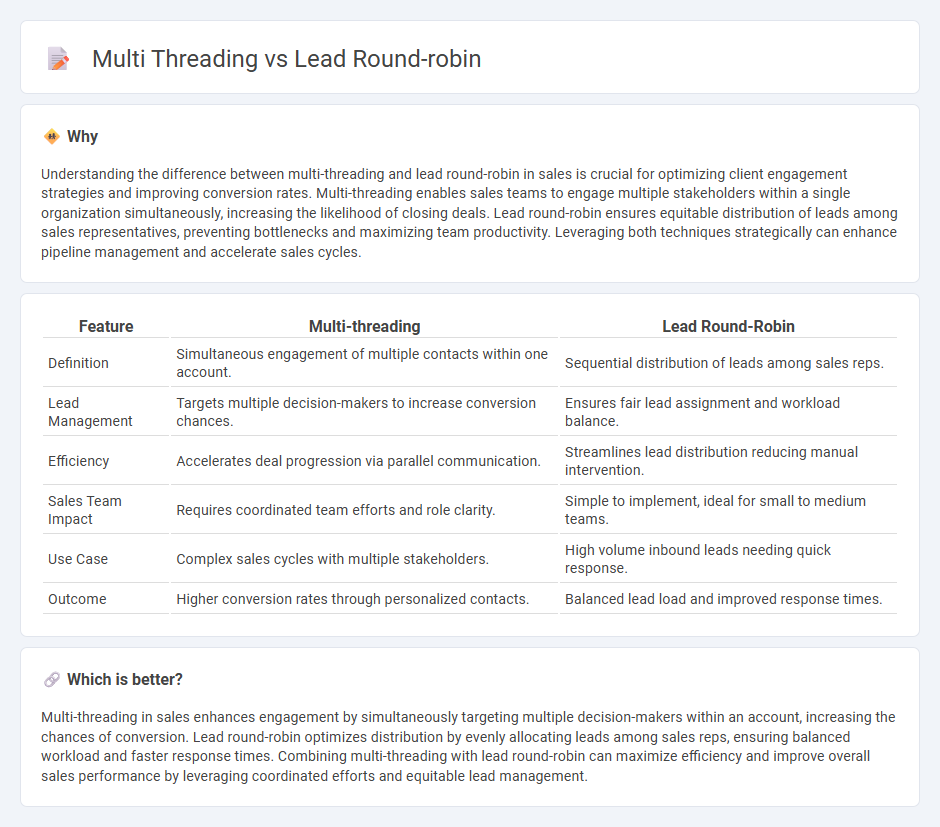
Multithreading in sales involves assigning multiple team members to engage with a single lead, increasing the chances of conversion through varied touchpoints. Lead round-robin distributes leads evenly among sales reps, promoting fair workload balance and faster response times. Explore how these strategies impact your sales performance for optimized results.
Why it is important
Understanding the difference between multi-threading and lead round-robin in sales is crucial for optimizing client engagement strategies and improving conversion rates. Multi-threading enables sales teams to engage multiple stakeholders within a single organization simultaneously, increasing the likelihood of closing deals. Lead round-robin ensures equitable distribution of leads among sales representatives, preventing bottlenecks and maximizing team productivity. Leveraging both techniques strategically can enhance pipeline management and accelerate sales cycles.
Comparison Table
| Feature | Multi-threading | Lead Round-Robin |
|---|---|---|
| Definition | Simultaneous engagement of multiple contacts within one account. | Sequential distribution of leads among sales reps. |
| Lead Management | Targets multiple decision-makers to increase conversion chances. | Ensures fair lead assignment and workload balance. |
| Efficiency | Accelerates deal progression via parallel communication. | Streamlines lead distribution reducing manual intervention. |
| Sales Team Impact | Requires coordinated team efforts and role clarity. | Simple to implement, ideal for small to medium teams. |
| Use Case | Complex sales cycles with multiple stakeholders. | High volume inbound leads needing quick response. |
| Outcome | Higher conversion rates through personalized contacts. | Balanced lead load and improved response times. |
Which is better?
Multi-threading in sales enhances engagement by simultaneously targeting multiple decision-makers within an account, increasing the chances of conversion. Lead round-robin optimizes distribution by evenly allocating leads among sales reps, ensuring balanced workload and faster response times. Combining multi-threading with lead round-robin can maximize efficiency and improve overall sales performance by leveraging coordinated efforts and equitable lead management.
Connection
Multi-threading in sales involves engaging multiple contacts or decision-makers within a single account to increase the chances of closing a deal. Lead round-robin is a distribution method that assigns incoming sales leads evenly across sales representatives, ensuring balanced workloads and faster response times. Together, multi-threading and lead round-robin optimize sales efficiency by maximizing coverage within accounts and accelerating lead follow-up.
Key Terms
Lead Distribution
Lead round-robin and multithreading represent two distinct approaches in lead distribution systems. Lead round-robin assigns leads sequentially to sales representatives, ensuring equal distribution without overlap or delay, whereas multithreading allows simultaneous processing of lead assignments, enhancing system efficiency and reducing latency. Explore more to understand which method optimizes lead distribution for your business needs.
Sales Team Structure
Lead round-robin allocation evenly distributes sales leads among team members to ensure balanced workload and maximize conversion potential. Multi-threading in sales teams involves multiple representatives simultaneously engaging a single lead, increasing touchpoints and chances of closing a deal. Explore how combining lead round-robin with multi-threading can optimize your sales team structure and boost revenue.
Conversion Efficiency
Lead round-robin scheduling distributes tasks evenly across processors but may cause frequent context switching, impacting conversion efficiency and throughput. Multi-threading enhances conversion efficiency by enabling concurrent execution within threads of a single process, reducing idle time and improving resource utilization. Explore deeper insights into optimizing conversion efficiency using lead round-robin and multi-threading techniques.
Source and External Links
Round-Robin Lead Assignment: A Smarter Way to ... - Round-robin lead assignment is a system that evenly distributes leads among sales reps in a set order, ensuring balanced workloads and preventing missed opportunities by assigning each new lead to the next available rep in a recurring cycle.
What is Round Robin Lead Scheduling and How to Create it? - Round-robin lead scheduling assigns leads in rotation to sales reps so everyone gets an equal share, ideal for high-volume inbound leads to ensure fair distribution and avoid workload bias.
Round Robin Lead Distribution Best Practices - Round robin is a lead distribution strategy that cycles leads through sales reps evenly to improve lead response times and provide all reps equitable selling opportunities.
 dowidth.com
dowidth.com